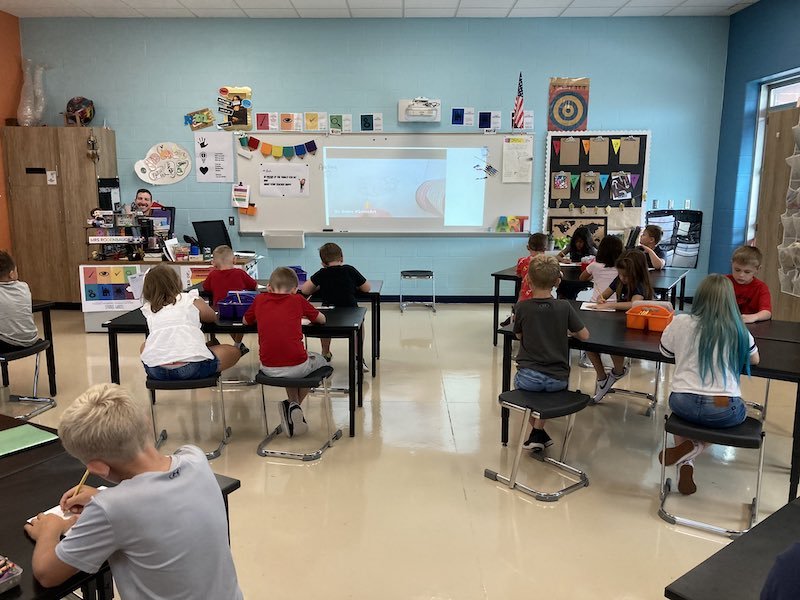A Network of Passionate Educators
Students who participated in Erase the Space exchanges with peers from different schools describe the work they have done in an interview with a reporter from the local CBS-TV affiliate.
“NexT Hub is a community. It’s place for educators to meet, to challenge, to share, and to build. It’s a time when they can shape and mold and reimagine things. It’s a place to be creative – and everybody is bringing to it such strength and joy.”
Derek Burtch, English teacher, Olentangy High School; Co-Founder, Erase the Space
In 2016, Derek Burtch taught English to high school students in a predominantly white suburban school district just north of Columbus. A colleague and friend, Amelia Gordon, was an English teacher at Columbus City Schools’ urban, predominantly African American, South High, when over a cup of coffee they decided to begin a letter writing exchange between their students. While their schools are only 20 miles apart, their students live in very different worlds. Their intent was to match these teens from disparate backgrounds to learn with and from each other, eventually creating a dialogue that would link them together, transcending the system that has been structured to segregate them throughout their school years.
The topic the educators chose to study was uncomfortable to broach, at best. “Our shared issue was segregation in Columbus and looking at how that impacted both groups of students,” explains Mr. Burtch, who continues to teach at Olentangy Liberty High School in Powell. “We wanted to engage students in learning together; then we wanted them to talk about it online, trade letters, and meet in person.” Ultimately, the groups would create a presentation together and propose ideas to confront problems facing their community.
“We were trying to simulate the democratic process, and we found out it worked,” says Mr. Burtch, emphasizing that the teachers were committed to providing a safe space where authentic discussion could take place and all students were respected for their individual thoughts. “Once we got out of the way, the students interacted and came up with wonderful ideas.”
Mr. Burtch admits that as educators they, too, discovered much about their own biases during the process. When examined, they found their beliefs as to what it is like to teach in an urban or suburban district or the types of challenges students living outside their district face were often based on assumptions that were not true. “We had to take a hard look and reflect on things we hadn’t reflected on before,” Mr. Burtch says. He and Ms. Gordon then recognized the benefits this experience could have for other educators as well.
Mr. Burtch and Ms. Gordon continued the cross-district exchanges with students from their schools the following year. At the same time, they worked to involve additional central Ohio schools, teachers, and students in the experience. Eventually, they created “Erase the Space,” a non-profit “teacher-created, teacher-run, and teacher funded organization” that works to “give students the power to be agents of change.” By 2019-2020, Erase the Space worked with 16 teachers in five different school districts to facilitate writing exchanges.
Partnering with Otterbein University, Erase the Space created and is facilitating networks of teachers from nine school districts across central Ohio: Westerville, Dublin, Gahanna, Columbus, Olentangy, Hilliard, Whitehall, and Worthington. Teachers from all three levels of public school are part of this cohort (elementary, middle, and high school teachers).
In 2020-21, the focus shifted. With a grant from the Martha Holden Jennings Foundation, Erase the Space partnered with Otterbein University to create NexT Hub to provide professional development in educational justice and equity to educators in central Ohio. Through NexT Hub, Mr. Burtch is working jointly with Margaret Koehler, professor and chair of English at Otterbein University, on a range of projects to improve the quality of teaching for inclusive excellence and to support the learning of all students.
“Teachers yearn for a space where passionate conversations lead to creative solutions,” the educators wrote in their grant request to the Foundation. “Isolating teachers within a district and segregating them by district diminishes discourse and potential for excellent teaching. Teacher learning dedicated to inclusive excellence and equity education is vital to alleviating barriers to learning for all students.”
NextT Hub attracted 32 teachers from 9 different K-12 schools to participate in a half dozen professional development sessions during the past year. Titled From “Civil” Voyeurism to Civic Action, the series addressed a variety of topics: Reflections on white supremacy in the classroom and community; Creating a “brave space” to discuss race; Making of metropolitan inequality; What do your students need?; and How did we get here and where do we go from here? Due to the pandemic, all sessions were held virtually.
Exchanges between teachers have also been established and reflect the same learning steps as the initial student exchanges: listening, learning, reflection, and action. In between PD sessions, participants are sharing writings and reflections about what they are noticing in their classrooms. Next year, these teachers plan to facilitate similar exchanges with their students.
“We are hoping as the learning series continues, we will go beyond talking about it in class to actually engaging in action and change in a way that will benefit our students,” says Dr. Koehler, adding that NexT Hub is also growing additional networks, facilitating book discussions, and considering an oral history project where students will interview peers from their exchange schools to discover how their learning experiences differed during the pandemic.
“We tell our teachers this is a place to be honest,” Mr. Burtch concludes. “It’s a place where honesty can be constructive…It’s a time when teachers can start to shape and mold and reimagine things. That’s what I would say is the big word that describes NexT Hub: it’s about reimagining.”



